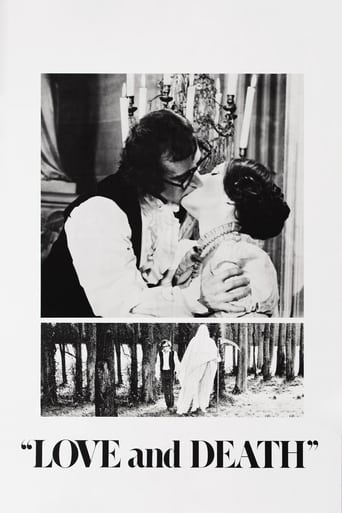The Comedy Sensation of the Year!
"Love and Death" (1975), a cinematic gem produced by United Artists, Jack Rollins & Charles H. Joffe Productions, is a delightful concoction of satire, romance, and existential musings set against the backdrop of 19th-century Russia. Directed by the inimitable Woody Allen, who also stars as the bumbling yet endearing Boris Grushenko, the film masterfully blends historical parody with philosophical inquiry. Boris's misadventures begin as he is conscripted into the Russian army to fight Napoleon, leading to a series of comedic escapades that showcase Allen's unique brand of humor. The film's narrative is propelled by Boris's unrequited love for his cousin Sonja (Diane Keaton), whose own romantic entanglements add layers of complexity and hilarity to the plot. What sets "Love and Death" apart is its fearless blending of high and low comedy, juxtaposing slapstick gags with profound reflections on life and mortality. Allen's script is peppered with witty one-liners and clever references to Russian literature and philosophy, making it a treasure trove for cinephiles and intellectuals alike. The film's visual style, characterized by its meticulous period detail and Sergei Rachmaninoff's stirring score, adds a layer of authenticity that enhances the comedic elements. Diane Keaton's portrayal of Sonja is equally noteworthy, as she effortlessly shifts between comedic and dramatic tones, providing a perfect foil to Allen's neurotic Boris. The film's exploration of themes such as love, death, and the absurdity of human existence is both poignant and uproariously funny. Boris's internal monologues, often delivered directly to the camera, invite the audience into his existential dilemmas, creating a unique intimacy that is rare in comedy films. The climactic duel between Boris and Napoleon, a scene that brilliantly encapsulates the film's blend of absurdity and philosophical depth, is a testament to Allen's skill in weaving together seemingly disparate elements into a cohesive and entertaining whole. "Love and Death" remains a standout in Woody Allen's oeuvre, not only for its comedic brilliance but also for its daring exploration of life's big questions. Produced by United Artists, Jack Rollins & Charles H. Joffe Productions, this film is a testament to the power of laughter in the face of life's inevitable end. It is a must-watch for anyone who appreciates the art of satire and the timeless quest for meaning in a chaotic world.
Año1975
Presupuesto3000000$
Duración85 minuto
Ingresos20173742$
GénerosComedia
Países de producciónUnited States of America

